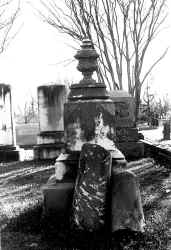Collapses The old man had tended the rope bridge for sixty years or more, since long before the bright new highway bridge materialized upstream and rendered him, and the bridge, and the little tender's cottage where he lived curiosities, flanked by a park. His hands were polished smooth and lineless from splicing the heavy lines, and his nails were black with the pitch he boiled the ropes in to make them shed the rain. Once, the bridge had been the only way to cross the river for thirty miles in either direction. But it was no more than a tourist attraction by the day it collapsed, under the weight of seventy-nine Pentecostal tourists come down for the day from the capital city. More were waiting to join the others, standing in line, right up until the second the cables creaked and snapped and spilled them eighty feet onto the summer-dry rocks where the turtles sunned. At the tribunal three days after the collapse, the evidence was brought forward: The witnesses, who described the old bridge-tender coaxing more and more of the tourists onto the bridge, even as it groaned and protested, the old man swearing to their fiery God and Jesus and his mother's eyes that the bridge would hold a thousand of them. A photographer in hipwaders had positioned himself upstream, and when the bridge collapsed, he caught them: nine glossy prints in full color, the Pentecostals in mid-air, mouths frozen, then their bodies broken on the sun-dusty stones. At the tribunal, a blow-up of one of the photographs was brought forward -the one taken two seconds before the lines snapped and cast them down- and in the corner of the shot, you could just make out the old bridge-keeper, his hair startlingly white in the sun, arms outstretched, ushering more onto the bridge. The judge was young, with a tuft of hair like a peninsula on his pate. The bridge-keeper stood before him, stooped and broken as a coward. The judge asked how the old man could have allowed it to happen. But what he really meant was: How could God allow this? The judge's grandmother was Pentecostal, and dead, and her memory glowed in his mind like candlelight. In answer, the old man simply shrugged, staring at the floor, so that everyone present in the courtroom, all the reporters and retirees with nothing better to do and all the relations of the dead Pentecostals, all shook their heads and made twiddling motions near their ears, the universal sign for "crazy". The old man was not crazy, however. He was silent because there was no hope for him to ever explain. How could he say, for instance, that he himself had once driven a Model T Ford across that very bridge on a dare, the cleats on either side popping and clattering, but not giving? How could he tell the story of how a drunken cowboy had once ridden an eleven-hundred pound bay mare to the middle of that bridge? How the cowboy had snatched at the reins until the horse had stood against the sky, defiant against the rocks below -the rocks the same color as the horse but not her blood? The old man had sat and stared out at the bridge for sixty-odd years from the window of his little house. He had watched the tourists scale it warily, testing each board for weakness before giving it their full weight. He could have told them not to worry. He had bolted every plank in place himself, painted it and scattered the wet paint with sand for grip. He had salted the bridge in the winters. He had walked it in the wind to feel it beneath him, swaying, gentle as water. It was not concrete. It was everything concrete was not. Concrete knew nothing of rot or breaking-strain. It knew nothing of fray. The rope bridge was spindly, weak to look at but strong in spirit, something man had made in his own image to thwart God and His river. The old man knew that when he died, the bridge would fall into disrepair, and then the city would dispatch men in dark goggles with torches to send it in a tangle to the riverbed below. How could he explain the feeling he knew when he saw the hundred Pentecostals rise from their potato salad and fried chicken in the park that flanked the bridge? How could he speak of all the years he had tended the long span, and watched it hang in sun and rain and snow, waiting for that moment?
He couldn't, so when the judge asked him How Could He, but meant God,
the old man shrugged. And the judge dropped his gavel and sent him away
to the State Hospital for sixty days observation. And as the bailiffs
led the old man shuffling out, the courtroom rose, and the relatives of
the dead rose, and the reporters rose. And they called to the old man,
some calling his name and some calling out questions and some calling
out for his blood. And as the judge slapped his gavel and bellowed for
order, the old bridge-keeper gave a wistful smile, that was seen as
further evidence of his madness. But, as I said, he was not crazy. He smiled because, in his mind, he was remembering the moment-the instant-just before the bridge collapsed and spilled the seventy-nine into the river like angels. That one second when he stood in the sun, arms outstretched, as if he himself bore the weight of them.
|
(photo by Jessica Harbour) |
